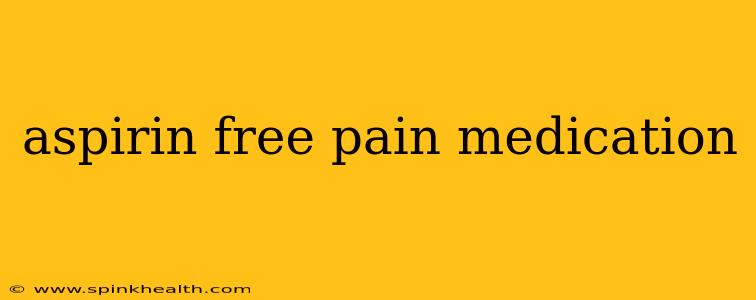For many, the familiar white tablet of aspirin represents quick relief from aches and pains. But what if you're allergic to aspirin, or simply looking for alternatives? The good news is, there's a wide world of aspirin-free pain medication options available, each with its own strengths and considerations. Let's explore this landscape together, navigating the various choices to find the best fit for your needs.
My journey into understanding aspirin-free pain relief began with a personal experience. A close family member suffered a severe allergic reaction to aspirin, highlighting the critical need for safe alternatives. This sparked my research into the various options available, and I’m excited to share my findings with you.
What are some common aspirin-free pain relievers?
This is a question I hear frequently, and the answer is reassuringly diverse. The most common aspirin-free pain relievers fall into a few key categories:
-
Non-Steroidal Anti-Inflammatory Drugs (NSAIDs): Ibuprofen (Advil, Motrin) and naproxen (Aleve) are popular choices in this category. They work by reducing inflammation and pain, and are effective for a range of conditions, from headaches to menstrual cramps.
-
Acetaminophen (Paracetamol): This is another widely used pain reliever, often found under brand names like Tylenol. Acetaminophen is particularly effective for fever reduction and mild to moderate pain. It's crucial to remember that acetaminophen should not be taken in excessive doses, as it can cause liver damage.
-
Topical Analgesics: These pain relievers are applied directly to the skin, making them ideal for localized pain like muscle aches or arthritis. Common examples include creams and gels containing menthol, camphor, or capsaicin (the active ingredient in chili peppers).
What is the best aspirin-free pain reliever for headaches?
The "best" pain reliever for headaches often depends on the type and severity of the headache. For tension headaches or migraines, ibuprofen or naproxen can be effective in reducing both pain and inflammation. Acetaminophen is another good option for milder headaches. However, it's crucial to consult a doctor if headaches are frequent, severe, or accompanied by other symptoms.
What are some natural aspirin-free pain relief options?
For those seeking a more natural approach, several alternatives exist:
-
Heat and Cold Therapy: Applying heat or cold packs to the affected area can offer relief from pain and inflammation.
-
Massage: Gentle massage can help relax muscles and alleviate pain.
-
Acupuncture and Acupressure: These ancient techniques involve stimulating specific points on the body to reduce pain and improve overall well-being. Their efficacy is still under investigation, but many find them beneficial.
-
Essential Oils: Certain essential oils, like peppermint or lavender, have been traditionally used for pain relief. However, it’s vital to use them carefully and dilute them properly before applying them to the skin.
Which aspirin-free pain reliever is best for arthritis?
Arthritis pain, often characterized by inflammation, often responds well to NSAIDs like ibuprofen or naproxen. These medications can help reduce both pain and inflammation in the affected joints. However, long-term use of NSAIDs can carry risks, so it's crucial to consult with a doctor for appropriate management of arthritis pain. They may recommend other treatments in conjunction with or instead of NSAIDs.
Can I take aspirin-free pain relievers with other medications?
This is a crucial question, as interactions between medications can be dangerous. Always check with your doctor or pharmacist before combining any pain relievers with other medications, particularly prescription drugs. Some interactions can be mild, others significantly harmful.
What are the side effects of aspirin-free pain relievers?
All medications have potential side effects. NSAIDs can cause stomach upset, gastrointestinal bleeding, and kidney problems in some individuals. Acetaminophen, if taken in excessive doses, can cause liver damage. Always follow the recommended dosage on the product label and consult your doctor if you experience any adverse effects.
Remember, this information is for educational purposes only and should not be considered medical advice. Always consult a healthcare professional for personalized recommendations regarding pain management. They can help you determine the most appropriate aspirin-free pain medication and dosage for your specific needs and health conditions. Your health and well-being are paramount, so don't hesitate to seek expert guidance.

